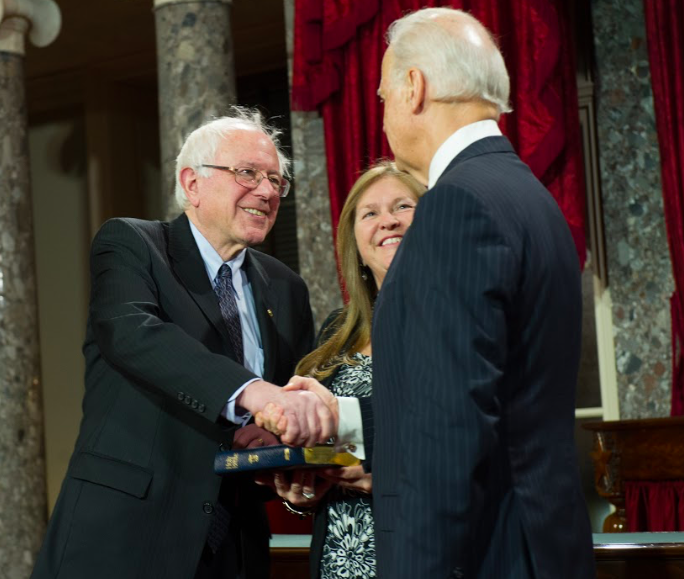Coronavirus throws a wrench into the 2020 election
Photo Wikipedia Commons
Bernie Sander and Joe Biden shaking hands
With the coronavirus pandemic growing in America by the day, everything from schools to stores to restaurants across the nation are shutting their doors in order to avoid community spread of the virus. Subsequently, several states have postponed their primary elections for the 2020 presidential race in order to avoid congregation, complicating the race in an unforeseen way.
As of April 2, Alaska, Connecticut, Delaware, Georgia, Hawaii, Indiana, Kentucky, Louisiana, Maryland, New York, Ohio, Pennsylvania, Rhode Island, Wyoming, Puerto Rico, New York and West Virginia have all rescheduled their contests or converted to voting by mail with an extended deadline.
Six of those states have moved their primaries to June 2, which has suddenly become a very consequential day for the Democratic primary calendar. According to The New York Times, “It is among the last dates available before the June 9 deadline set by the Democratic National Committee (DNC) for states to hold their nominating contests.” Given this, many have begun to wonder whether New Jersey will be pushing back June primaries. New York announced it will be postponing its primary election until June 23.
“It’s hard to say [if New Jersey will push back its contest],” said WHS AP Government and Politics Teacher Enrico Basso. “Ultimately, it would depend on the amount of Democratic voters that would be getting hit in the pocket. It really depends on how long the executive orders to remain home go on, and whether or not people in New Jersey and New York feel it is an abuse of the situation.”
This shakeup comes at a time when former Vice President Joe Biden and Vermont Senator Bernie Sanders are locked in a bitter race to be the Democratic nominee for president. Biden has held a comfortable delegate lead and a solid lead in the polls for some time, but a poll released 2 weeks ago by Reuters-Ipsos showed Sanders trailing Biden by just 9 percentage points, only 1 week after trailing Biden by 21 points in the same poll.
Basso, however, remains skeptical that the virus will play a significant role in affecting Biden’s lead. “Bernie and Biden don’t really have much to do during this time,” explained Basso. “Their virtual town halls have been a bit awkward to watch. Other than that, there are things that have taken a back seat that may impact Biden, depending on the outcome. [For instance], Biden has been accused of sexual assault, which he has denied.”
The pandemic has also had a significant effect on President Trump’s standing both within his own base and the country as a whole. The president’s approval rating is now at 49 percent according to CNN, his highest since 2018. Crises often allow a president to be viewed favorably, as presidents act as the face of the government’s response. However, many experts have been publicly calling for a nationwide shelter-in-place, which Trump has thus far refused to do, which may hurt his approval rating if the number of confirmed COVID-19 cases keeps rising. Even so, in an ABC News/Washington Post poll released on March 29, 53 percent of Trump’s supporters claim to be “highly enthusiastic” about him, compared to just 24 percent of Biden’s.
However, a dark-horse candidate may be emerging: Andrew Cuomo, the governor of New York. Cuomo is in charge of the hardest-hit state, and has been making a series of public speeches and press conferences where he has emerged as a calm, yet authoritative voice to many voters. As such, rumors have begun to circulate among political analysts that Cuomo may be considering throwing his hat into the ring at the Democratic National Convention in July. On Mar. 28, Fox News political analyst Tucker Carlson boldly claimed that the DNC will replace Biden or Sanders as the nominee in favor of Cuomo.
“I’m not sure what a governor’s benefit would be to run on the fact that he handled the pandemic well,” said Basso. “There isn’t much else there to run on in such a short period of time.”
Regardless, it’s clear that how each candidate (or potential candidate) chooses to frame their message surrounding the coronavirus and its economic and social effects on American society will have a great impact on their standing with voters across the country over the next few months, even if more primary elections are further delayed.

